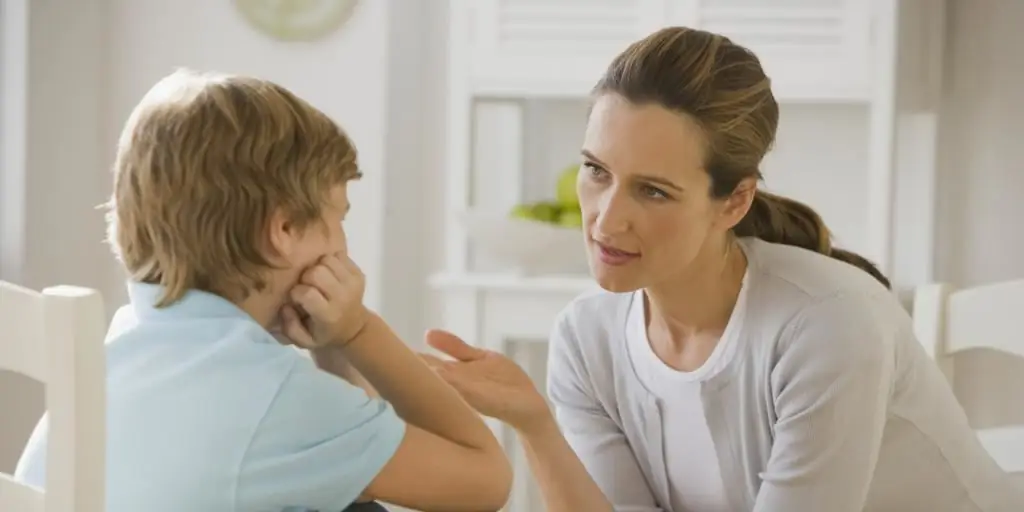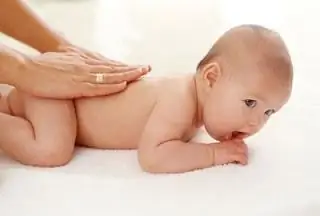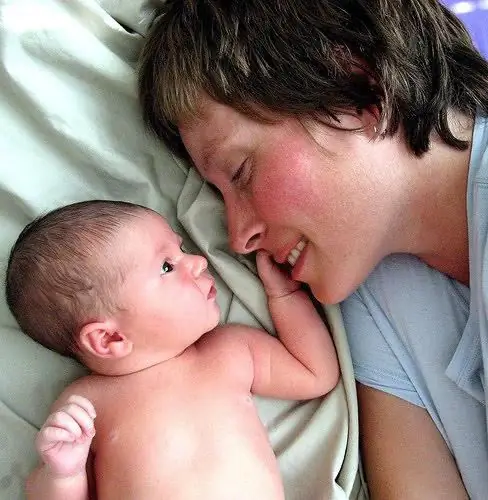2026 Author: Priscilla Miln | miln@babymagazinclub.com. Last modified: 2025-01-22 17:55:26
The baby's first steps are a whole event for him and his parents. But sometimes relatives begin to notice that the child walks on tiptoes. In this regard, the question arises - is this condition the norm or a deviation?
Toe walking is not always a cause for concern, and such a symptom may go away on its own. But also a similar walking method can indicate various disorders in the development of a small organism, including neurological ones. So why does the child walk on tiptoes?
Development rate

Child walks on toes. The reasons for this phenomenon are varied. The following signs are considered within the normal range:
- this happens when the baby is experimenting with a new kind of walking, playing, attracting attention;
- when imitating other people;
- if trying to reach something;
- excessive mobility of the child, when, while running or fast walking, he does not have time to fully stand on his entire foot;
- very often walking on toes occurs in children who for a long timeused walkers. In this case, a correction may be required.
The main sign that allows us to draw a conclusion about the normal development of the child is the situation in which this way of walking is observed not constantly, but periodically.
Pathological causes of toe walking
If a child walks on tiptoes all the time, and it doesn’t work out in a different way, then this may indicate serious problems. Mostly neurological and psychological.
The main reasons are:
- Nervous excitability.
- Muscle hypertonicity.
- Psychological trauma or stress. These conditions may be accompanied by other signs - there is a sleep disturbance, the child stops talking, relieves himself in his pants.
- Disturbance in the functioning of the musculoskeletal system.
- Muscular dystonia. A situation in which the muscles of the legs are both in hypertonicity and hypotonicity at the same time. This pathology must be treated in a timely manner, as it can lead to more serious consequences, such as impaired posture, lameness, curvature of the spine.
- Pyramidal insufficiency. This is a disease that arose due to a birth injury of the cervical spine.
- Infantile cerebral palsy.
- A very serious situation is when a child who stood on his whole foot, after an illness, began to walk on his toes. There is a risk that the disease has contributed to the development of neurological problems. The same applies to vaccinations.
At riskthere are children who received a birth injury, were born prematurely, and if there were complications during pregnancy.
Reason for toe walking at 1 year old

Some parents are alarmed by the fact that a child walks on tiptoes a year. But at this age, this may be a normal condition. Many children begin to take their first steps at this age, and this way of walking is just trying something new. So, if a child of 1 year old walks on toes, but does not do it all the time, and there are no other reasons for concern, you should not worry. The only recommendation would be to monitor the condition.
Toe walking for children aged 2 and over
When a two-year-old child walks on tiptoes, the reasons are the same as those of one-year-old children. But still, this behavior should gradually fade away. It is necessary to monitor the baby - how often a child walks on tiptoes at 2 years old, whether there are any deviations in the musculoskeletal system, whether there are neurological problems and an unbalanced mental state. In case of any suspicion, you should consult a doctor.
If toe walking continues or suddenly appeared at the age of 3-5 years, it is worthwhile, without delay, to seek advice from specialists, primarily a neurologist.
Actions

Many parents, after discovering this feature when walking, are wondering - if the child walks on tiptoes, what should I do? First of allyou need to see a doctor, especially if the above symptoms occur. Since there are a lot of reasons for such behavior when walking, the method of treatment and correction is selected by the doctor individually. Multiple specialist consultations may be required:
- pediatrician;
- orthopedist;
- neurologist.

If no serious pathologies were found during the examination, the doctor prescribes corrective treatment. It may include the following procedures:
- Therapeutic massage, which increases blood circulation, normalizes muscle tone, the condition of ligaments, tendons. By the way, a simple massage can be performed by the parents themselves. This may include rubbing the calf muscles, drawing a figure eight on the feet, pushing and pulling the child's feet.
- Therapeutic exercise. Increases blood circulation in the muscles.
- Electrophoresis is prescribed to relieve hypertonicity.
- Swimming. Develops motor skills.
- Paraffin wraps that relax leg muscles. But this procedure is contraindicated for children with diabetes and diseases of the cardiovascular system.
- Wearing orthopedic shoes, but only after doctor's advice.
- Give your baby room to move.
- Walking barefoot on special orthopedic mats.
- Balneotherapy.
- Medications are prescribed when other methods have not helped at all or have given little result.
If no treatment has given within 12 monthsresults, the doctor will decide on the surgical intervention.
When to See a Doctor ASAP

There are signs that indicate that you need to see a doctor as soon as possible to rule out serious consequences. These signs are:
- toe walking most of the time;
- child stumbles very often;
- baby can't bear weight on his feet;
- child loses motor skills they used to have, or there is a delay;
- poor coordination appeared;
- palpation reveals stiff leg muscles.
What to do if the doctor insists on taking medication
There are cases when the attending physician, in addition to the main corrective treatment, prescribes medication. If there are no serious neurological problems, then the use of medications is not entirely advisable. If parents do not trust their doctor, they can seek advice from an outside specialist.
Consequences of walking on toes

If a baby after two or three years continues to walk on toes for a long time, then without proper treatment and correction of this condition, the heel may stop growing, since there will be no proper load on it. The forefoot expands, thereby increasing the risk of ankle and tendon atrophy. There is disproportion. This, in turn, can lead to the followingconsequences:
- Bad posture. If the spine is in a curved state for a long time, the work of internal organs may be disrupted.
- Deformation of the feet, leading to the curvature of the baby's legs. For this reason, it will be difficult for the child to lead an active lifestyle.
- Child behind in physical development.
- Clubfoot.
- Wryneck.
- Incoordination.
- Back pain.
In closing

In most cases, toe walking does not require any serious treatment and often goes away on its own. If preventive measures are taken with the child (massage, gymnastics), then this condition can be prevented before it appears. Do not worry if, in addition to such a short manner of walking, there are no other third-party symptoms. At the first symptoms of neurological or other disorders, you should immediately go to the doctor. After all, timely consultation and, if necessary, treatment can minimize the consequences. A timely identified problem is the first and very important step towards its successful solution. If you are wondering why a child walks on tiptoes, only a doctor can give a competent full answer.
In any case, even if walking on toes does not appear often, you should quickly seek advice from a medical institution. Indeed, in matters of child he alth, precious time should not be wasted.
Recommended:
A child of 3 years old does not obey: what to do, the psychology of the child's behavior, the causes of disobedience, advice from child psychologists and psychiatrists

It is quite a common situation when a child of 3 years old does not obey. What to do in this case, not all parents know. Many of them try to calm the child with persuasion, shouting and even physical impact. Some adults just go on about the baby. Both of them make mistakes. Why does a three-year-old child not obey and how to stop it? This post will answer these questions
The child stands on his toes: causes, norms and deviations, advice from pediatricians

Many parents of babies notice that the child gets up on his toes, and not on his foot. This phenomenon causes new parents to worry and think about getting advice from a qualified pediatric surgeon
Dry skin in a child. Dry skin in a child - causes. Why does a child have dry skin?

The condition of a person's skin can tell a lot. Most of the diseases known to us have certain manifestations on the skin in the list of symptoms. Parents should pay attention to any changes, whether it is dry skin in a child, redness or peeling
My child walks on toes, what should I do?

One of the most important human functions is movement. It is she who forces to carry out simple and complex movements that require both minimal effort and high energy costs
The daily routine of a child at 4 months: food, sleep, walks

Every parent takes care of their child and wants him to always be cheerful and he althy. The daily routine of a child at 4 months will help parents correctly allocate time. It is enough to follow a few simple rules that are prescribed by the regime, and the baby will always be in a good mood

